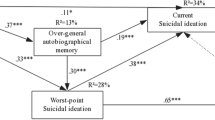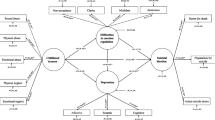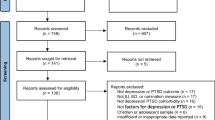Abstract
Rumination and childhood trauma are related to depressive symptoms in clinical and non-clinical individuals. This is the first study aimed to test the mediating effect of rumination on the relationship between childhood trauma and depressive symptoms in schizophrenia patients. A total of 313 schizophrenia patients were recruited in the present study. The 17-item Hamilton Depression Rating Scale (HAMD-17) was adopted to evaluate depressive symptoms, the short-form Childhood Trauma Questionnaire (CTQ-SF) and the 10-item Ruminative response scale (RRS-10) were utilized to assess the childhood trauma and rumination in patients, respectively. Our results showed that 168 schizophrenia patients (53.67%) had comorbid depressive symptoms. These patients with depressive symptoms had higher levels of childhood trauma [both CTQ-SF total scores and emotional abuse (EA), emotional neglect (EN), physical neglect (PN) subscale scores] and rumination (both RRS-10 total scores and brooding, reflection subscale scores) compared to patients without depressive symptoms. The stepwise logistic regression analysis identified that EN (OR 1.196, P = 0.003), PN (OR 1.1294, P < 0.001), brooding (OR 1.291, P < 0.001) and reflection (OR 1.481, P < 0.001) could independently predict the depressive symptoms in schizophrenia patients. Moreover, RRS-10 and its subscale scores could mediate the relationship between depressive symptoms and childhood trauma, especially EA, EN and PN in schizophrenia. Our preliminary findings suggest that the rigorous assessment and psychosocial interventions of rumination are important to alleviate the influence of childhood trauma on depressive symptoms in schizophrenia patients.

Similar content being viewed by others
Data availability statement
Original data of this study are available upon request from the corresponding author.
References
Sönmez N, Røssberg JI, Evensen J, Barder HE, Haahr U, Ten Velden HW, Joa I, Johannessen JO, Langeveld H, Larsen TK, Melle I, Opjordsmoen S, Rund BR, Simonsen E, Vaglum P, McGlashan T, Friis S (2016) Depressive symptoms in first-episode psychosis: a 10-year follow-up study. Early Interv Psychiatry 10:227–233. https://doi.org/10.1111/eip.12163
Basu S, Verma S, Abdin E (2020) The evolution of depression in first-episode psychosis: a naturalistic database study. Clin Psychol Psychother 27:611–620. https://doi.org/10.1002/cpp.2449
Upthegrove R, Marwaha S, Birchwood M (2017) Depression and schizophrenia: cause, consequence, or trans-diagnostic issue? Schizophr Bull 43:240–244. https://doi.org/10.1093/schbul/sbw097
Majadas S, Olivares J, Galan J, Diez T (2012) Prevalence of depression and its relationship with other clinical characteristics in a sample of patients with stable schizophrenia. Compr Psychiatry 53:145–151. https://doi.org/10.1016/j.comppsych.2011.03.009
Peitl V, Vidrih B, Karlović Z, Getaldić B, Peitl M, Karlović D (2016) Platelet serotonin concentration and depressive symptoms in patients with schizophrenia. Psychiatry Res 239:105–110. https://doi.org/10.1016/j.psychres.2016.03.006
Fang X, Chen Y, Wang Y, Ren J, Zhang C (2019) Depressive symptoms in schizophrenia patients: a possible relationship between sirt1 and bdnf. Prog Neuropsychopharmacol Biol Psychiatry 95:109673. https://doi.org/10.1016/j.pnpbp.2019.109673
Lange SMM, Schirmbeck F, Stek ML, Murk Jansen YR, van Rooijen G, de Haan L, Penninx B, Rhebergen D (2021) A comparison of depressive symptom profiles between current major depressive disorder and schizophrenia spectrum disorder. J Psychiatr Res 135:143–151. https://doi.org/10.1016/j.jpsychires.2021.01.009
Xu YM, Li F, Liu XB, Zhong BL (2018) Depressive symptoms in chinese male inpatients with schizophrenia: prevalence and clinical correlates. Psychiatry Res 264:380–384. https://doi.org/10.1016/j.psychres.2018.04.016
Herniman SE, Allott K, Phillips LJ, Wood SJ, Uren J, Mallawaarachchi SR, Cotton SM (2019) Depressive psychopathology in first-episode schizophrenia spectrum disorders: a systematic review, meta-analysis and meta-regression. Psychol Med 49:2463–2474. https://doi.org/10.1017/s0033291719002344
Medeiros GC, Prueitt WL, Minhajuddin A, Patel SS, Czysz AH, Furman JL, Mason BL, Rush AJ, Jha MK, Trivedi MH (2020) Childhood maltreatment and impact on clinical features of major depression in adults. Psychiatry Res 293:113412. https://doi.org/10.1016/j.psychres.2020.113412
Varese F, Smeets F, Drukker M, Lieverse R, Lataster T, Viechtbauer W, Read J, van Os J, Bentall RP (2012) Childhood adversities increase the risk of psychosis: a meta-analysis of patient-control, prospective- and cross-sectional cohort studies. Schizophr Bull 38:661–671. https://doi.org/10.1093/schbul/sbs050
Fan J, Liu W, Xia J, Li S, Gao F, Zhu J, Han Y, Zhou H, Liao H, Yi J, Tan C, Zhu X (2021) Childhood trauma is associated with elevated anhedonia and altered core reward circuitry in major depression patients and controls. Hum Brain Mapp 42:286–297. https://doi.org/10.1002/hbm.25222
Huang ZH, Hou CL, Huang YH, He XY, Wang QW, Chen X, Wang ZL, Wang SB, Jia FJ (2019) Individuals at high risk for psychosis experience more childhood trauma, life events and social support deficit in comparison to healthy controls. Psychiatry Res 273:296–302. https://doi.org/10.1016/j.psychres.2019.01.060
Kim SW, Kang HJ, Kim SY, Kim JM, Yoon JS, Jung SW, Lee MS, Yim HW, Jun TY (2013) Impact of childhood adversity on the course and suicidality of depressive disorders: the crescend study. Depress Anxiety 30:965–974. https://doi.org/10.1002/da.22088
Thomas S, Höfler M, Schäfer I, Trautmann S (2019) Childhood maltreatment and treatment outcome in psychotic disorders: a systematic review and meta-analysis. Acta Psychiatr Scand 140:295–312. https://doi.org/10.1111/acps.13077
Trotta A, Murray RM, Fisher HL (2015) The impact of childhood adversity on the persistence of psychotic symptoms: a systematic review and meta-analysis. Psychol Med 45:2481–2498. https://doi.org/10.1017/s0033291715000574
De-Nardin EMS, Muratori CA, Ribeiro IS, Huguete RB, Salgado JV (2021) Childhood trauma is associated with onset of symptoms, functioning and cognition in patients with schizophrenia. Trends Psychiatry Psychother. https://doi.org/10.47626/2237-6089-2019-0081
Pruessner M, King S, Veru F, Schalinski I, Vracotas N, Abadi S, Jordan G, Lepage M, Iyer S, Malla AK, Shah J, Joober R (2021) Impact of childhood trauma on positive and negative symptom remission in first episode psychosis. Schizophr Res 231:82–89. https://doi.org/10.1016/j.schres.2021.02.023
Mohammadzadeh A, Azadi S, King S, Khosravani V, Sharifi Bastan F (2019) Childhood trauma and the likelihood of increased suicidal risk in schizophrenia. Psychiatry Res 275:100–107. https://doi.org/10.1016/j.psychres.2019.03.023
Kelly DL, Rowland LM, Patchan KM, Sullivan K, Earl A, Raley H, Liu F, Feldman S, McMahon RP (2016) Schizophrenia clinical symptom differences in women vs. men with and without a history of childhood physical abuse. Child Adoles Psychiatry Ment Health 10:5. https://doi.org/10.1186/s13034-016-0092-9
Sahin S, Yüksel Ç, Güler J, Karadayı G, Akturan E, Göde E, Özhan AA, Üçok A (2013) The history of childhood trauma among individuals with ultra high risk for psychosis is as common as among patients with first-episode schizophrenia. Early Interv Psychiatry 7:414–420. https://doi.org/10.1111/eip.12022
Satyshur MD, Layden EA, Gowins JR, Buchanan A, Gollan JK (2018) Functional connectivity of reflective and brooding rumination in depressed and healthy women. Cogn Affect Behav Neurosci 18:884–901. https://doi.org/10.3758/s13415-018-0611-7
Tang H, Xiong T, Shi J, Chen Y, Liu X, Zhang S, Wang H, Lu Q, Yao Z (2021) Global and reflective rumination are related to suicide attempts among patients experiencing major depressive episodes. BMC Psychiatry 21:117. https://doi.org/10.1186/s12888-021-03119-z
Watkins ER (2008) Constructive and unconstructive repetitive thought. Psychol Bull 134:163–206. https://doi.org/10.1037/0033-2909.134.2.163
Cheref S, Lane R, Polanco-Roman L, Gadol E, Miranda R (2015) Suicidal ideation among racial/ethnic minorities: moderating effects of rumination and depressive symptoms. Cult Divers Ethn Minor Psychol 21:31–40. https://doi.org/10.1037/a0037139
Kim JS, Jin MJ, Jung W, Hahn SW, Lee SH (2017) Rumination as a mediator between childhood trauma and adulthood depression/anxiety in non-clinical participants. Front Psychol 8:1597. https://doi.org/10.3389/fpsyg.2017.01597
Cui Y, Kim SW, Lee BJ, Kim JJ, Yu JC, Lee KY, Won S, Lee SH, Kim SH, Kang SH, Kim E, Piao YH, Kang NI, Chung YC (2019) Negative schema and rumination as mediators of the relationship between childhood trauma and recent suicidal ideation in patients with early psychosis. J Clin Psychiatry. https://doi.org/10.4088/JCP.17m12088
Chen XJ, Wang DM, Zhou HX, Zhu RR, Tian Y, Du YX, Chen JJ, Chen DC, Wang L, Zhang XY (2021) Association of depressive symptoms with cognitive impairment in patients with never-treated first-episode schizophrenia: analysis of the depression in schizophrenia in china (disc) study. Gen Hosp Psychiatry 71:108–113. https://doi.org/10.1016/j.genhosppsych.2021.04.010
Fang X, Chen L, Wang D, Yu L, Wang Y, Chen Y, Ren J, Tang W, Zhang C (2019) Metabolic profiling identifies tc and ldl as potential serum biomarkers for depressive symptoms in schizophrenia. Psychiatry Res 281:112522. https://doi.org/10.1016/j.psychres.2019.112522
Fang X, Zhang R, Bao C, Zhou M, Yan W, Lu S, Xie S, Zhang X (2021) Abnormal regional homogeneity (reho) and fractional amplitude of low frequency fluctuations (falff) in first-episode drug-naïve schizophrenia patients comorbid with depression. Brain Imaging Behav. https://doi.org/10.1007/s11682-021-00465-0
Huang D, Liu Z, Cao H, Yang J, Wu Z, Long Y (2021) Childhood trauma is linked to decreased temporal stability of functional brain networks in young adults. J Affect Disord 290:23–30. https://doi.org/10.1016/j.jad.2021.04.061
He J, Liu Y, Cheng C, Fang S, Wang X, Yao S (2021) Psychometric properties of the chinese version of the 10-item ruminative response scale among undergraduates and depressive patients. Front Psychiatry 12:626859. https://doi.org/10.3389/fpsyt.2021.626859
Hou CL, Ma XR, Cai MY, Li Y, Zang Y, Jia FJ, Lin YQ, Chiu HF, Ungvari GS, Hall BJ, Zhong BL, Cao XL, Xiang YT (2016) Comorbid moderate-severe depressive symptoms and their association with quality of life in chinese patients with schizophrenia treated in primary care. Community Ment Health J 52:921–926. https://doi.org/10.1007/s10597-016-0023-5
Cohen CI, Ryu HH (2015) A longitudinal study of the outcome and associated factors of subsyndromal and syndromal depression in community-dwelling older adults with schizophrenia spectrum disorder. Am J Geriatr Psychiatry 23:925–933. https://doi.org/10.1016/j.jagp.2014.06.011
Lako IM, Taxis K, Bruggeman R, Knegtering H, Burger H, Wiersma D, Slooff CJ (2012) The course of depressive symptoms and prescribing patterns of antidepressants in schizophrenia in a one-year follow-up study. Eur Psychiatry 27:240–244. https://doi.org/10.1016/j.eurpsy.2010.10.007
Álvarez MJ, Masramom H, Foguet-Boreu Q, Tasa-Vinyals E, García-Eslava JS, Roura-Poch P, Escoté-Llobet S, Gonzalez A (2021) Childhhood trauma in schizophrenia spectrum disorders: Dissociative, psychotic symptoms, and suicide behavior. J Nerv Ment Dis 209:40–48. https://doi.org/10.1097/nmd.0000000000001253
Larsson S, Andreassen OA, Aas M, Røssberg JI, Mork E, Steen NE, Barrett EA, Lagerberg TV, Peleikis D, Agartz I, Melle I, Lorentzen S (2013) High prevalence of childhood trauma in patients with schizophrenia spectrum and affective disorder. Compr Psychiatry 54:123–127. https://doi.org/10.1016/j.comppsych.2012.06.009
Kessler RC, McLaughlin KA, Green JG, Gruber MJ, Sampson NA, Zaslavsky AM, Aguilar-Gaxiola S, Alhamzawi AO, Alonso J, Angermeyer M, Benjet C, Bromet E, Chatterji S, de Girolamo G, Demyttenaere K, Fayyad J, Florescu S, Gal G, Gureje O, Haro JM, Hu CY, Karam EG, Kawakami N, Lee S, Lépine JP, Ormel J, Posada-Villa J, Sagar R, Tsang A, Ustün TB, Vassilev S, Viana MC, Williams DR (2010) Childhood adversities and adult psychopathology in the who world mental health surveys. Br J psychiatry 197:378–385. https://doi.org/10.1192/bjp.bp.110.080499
Mandelli L, Petrelli C, Serretti A (2015) The role of specific early trauma in adult depression: a meta-analysis of published literature. Childhood trauma and adult depression. Eur Psychiatry 30:665–680. https://doi.org/10.1016/j.eurpsy.2015.04.007
Besharat MA, Issazadegan A, Etemadinia M, Golssanamlou S, Abdolmanafi A (2014) Risk factors associated with depressive symptoms among undergraduate students. Asian J Psychiatr 10:21–26. https://doi.org/10.1016/j.ajp.2014.02.002
Nolen-Hoeksema S (1991) Responses to depression and their effects on the duration of depressive episodes. J Abnorm Psychol 100:569–582. https://doi.org/10.1037//0021-843x.100.4.569
Halari R, Premkumar P, Farquharson L, Fannon D, Kuipers E, Kumari V (2009) Rumination and negative symptoms in schizophrenia. J Nerv Ment Dis 197:703–706. https://doi.org/10.1097/NMD.0b013e3181b3af20
Thomas N, Ribaux D, Phillips LJ (2014) Rumination, depressive symptoms and awareness of illness in schizophrenia. Behav Cogn Psychother 42:143–155. https://doi.org/10.1017/s1352465812000884
Parola N, Zendjidjian XY, Alessandrini M, Baumstarck K, Loundou A, Fond G, Berna F, Lançon C, Auquier P, Boyer L (2017) Psychometric properties of the ruminative response scale-short form in a clinical sample of patients with major depressive disorder. Patient Prefer Adher 11:929–937. https://doi.org/10.2147/ppa.S125730
Hasegawa A, Koda M, Hattori Y, Kondo T, Kawaguchi J (2013) Longitudinal predictions of the brooding and reflection subscales of the japanese ruminative responses scale for depression. Psychol Rep 113:566–585. https://doi.org/10.2466/02.15.PR0.113x24z5
Roelofs J, Rood L, Meesters C, te Dorsthorst V, Bögels S, Alloy LB, Nolen-Hoeksema S (2009) The influence of rumination and distraction on depressed and anxious mood: a prospective examination of the response styles theory in children and adolescents. Eur Child Adolesc Psychiatry 18:635–642. https://doi.org/10.1007/s00787-009-0026-7
Acknowledgements
We are deeply grateful to all participants and psychiatrists who took part in our study.
Funding
This work was supported by the National Key Research and Development Program of China (2018YFC1314302, 2018YFC1314300 and 2016YFC1307002), the National Natural Science Foundation of China (81771450, 81471358, 81971255 and 81571314), the Key Project supported by Medical Science and Technology Development Foundation, Nanjing Department of Health (YKK20090), and the Science and Technology Development Program of Nanjing Medical University (NMUB2019107).
Author information
Authors and Affiliations
Contributions
All authors contributed to the preparation of the manuscript. XF, XZ and CZ: conceptualized and designed the study. ZW, YZ, DW, LY, YW, YC, LC, HL, WT and CZ: recruited the participants and completed the screening assessments. XF, ZW and LW: analyzed the data and performed the statistical analysis. XF, ZW and LW: wrote the first draft of the manuscript. XF, XZ and CZ: acquired funding. All authors approved the final manuscript.
Corresponding authors
Ethics declarations
Conflict of interest
The authors declare no conflicts of interest.
Rights and permissions
Springer Nature or its licensor (e.g. a society or other partner) holds exclusive rights to this article under a publishing agreement with the author(s) or other rightsholder(s); author self-archiving of the accepted manuscript version of this article is solely governed by the terms of such publishing agreement and applicable law.
About this article
Cite this article
Fang, X., Wu, Z., Wen, L. et al. Rumination mediates the relationship between childhood trauma and depressive symptoms in schizophrenia patients. Eur Arch Psychiatry Clin Neurosci 273, 1085–1094 (2023). https://doi.org/10.1007/s00406-022-01525-2
Received:
Accepted:
Published:
Issue Date:
DOI: https://doi.org/10.1007/s00406-022-01525-2




